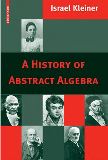Kleiner I. A History of Abstract Algebra. 2007.
 Kleiner I. A History of Abstract Algebra. - Birkhauser, 2007. - 168 p.
Kleiner I. A History of Abstract Algebra. - Birkhauser, 2007. - 168 p.
download (pdf)
This exposition provides a comprehensive historical account of the intellectual lineage behind the basic concepts, results, and theories of abstract algebra. Prior to the 19th century, the concept of "algebra" strictly referred to the study of the solution of polynomial equations. By the 20th century it came to encompass the study of abstract, axiomatic systems such as groups, rings, and fields.
Abstract algebra came into existence largely because mathematicians were unable to solve classical problems by classical means. A major theme of this book is to demonstrate how abstract algebra can illuminate the solution to some of these concrete problems. By focusing on the history of the sources of the subject and considering the context in which the originator of an idea was operating, the reader can better comprehend the "burning problem" that spurred the innovation, while gaining a deeper appreciation of the mathematics involved.
Key features:
* Begins with a substantial discussion of the history of classical algebra
* Contains separate chapters detailing the development of groups, rings, and fields
* Examines the history of linear algebra and relates its evolution to abstract algebra
* Highlights the lives and works of six notables: Cayley, Dedekind, Galois, Gauss, Hamilton, and especially the pioneering work of Noether
* Suggests a detailed outline for instructors on methods for integrating the history of abstract algebra into their teaching
* Each chapter concludes with suggested project assignments and extensive references to the relevant literature
The book may serve as a primary text for a course on the history of modern algebra, or as a supplemental text for an abstract algebra course or a more general course on the history of mathematics. Additionally, graduate students studying to become mathematics instructors or existing math teachers will find the work particularly useful as a guide for designing a course in abstract algebra inspired by history. Finally, algebraists and historians of science will find the book a valuable reference.

